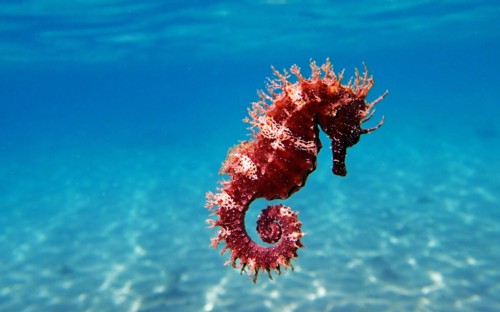

 Online Scuba Lessons |
 Online Nitrox Lessons |
Vertigo While
Ascending from
a Scuba Dive.



No matter how much fun you're having in Neptune's realm, and no matter what your air consumption rate is, sooner or later you have to return to the surface. I've discussed several areas of concern on ascents in this column, to which I would like to add... "The Vertigo of ascent".
The ear is a marvelous air structure with multiple capabilities. The ear is capable of turning pressure waves with about as much force as a gnat's flatulence into electrical signals that your brain then deciphers. An amazing little device. The ear also has semi-circular canals with both fluid and air space. It is this ratio between the fluid, the air spaces, and their relative location in specific gravity field that gives you your "sense of balance".
Upsetting the balance between each ear is what makes you feel dizzy on ascent. One ear equalizes pressure faster than the other, which results in two very different signals that the brain receives, thus causing your brain to sort of "average" the signals. As you continue to ascend your ears send more signals, your brain is confused, and you feel like you're on the Super Duper Zipper Flipper at one of the amusement parks in southern California.
Technically, it is referred to as "Transient Vertigo of Unequal Middle Ear Pressure" or, as our Master Divers know it, "Alternobaric Vertigo". This dizziness is generally short in duration and resolves itself when the two middle ears get their act together and the fluid/air/gravity ratios equalize.
So you get a little dizzy; big deal, right? Wrong. Severe vertigo is worse than hearing "Iím from the IRS, and Iím here to help". When you dive (properly) you lose part of your air-fluid-gravity ratio equation: gravity! Leaving only an air-fluid ratio to deal with. When you lose this ratio, it can be a disaster. (Actually, you don't lose gravity - but the buoyancy neutralizes it.)
Your eyesight is an important part of balance as well. The worse cases of Alternobaric vertigo are during blue water ascents: making an ascent where there are no visual point of reference (like the bottom or an anchor line). Divers report the feeling of "spinning uncontrollably," or "endless flipping end over end while falling," causing nausea and even vomiting.
Traditional recommendations involve equalization and reorientation. Once the pressure in the two ears becomes similar, the signals will be similar, and the symptoms generally resolve. If there is an ascent line or other relatively fixed structure available, grabbing it will help control the symptoms. Lacking a fixed structure, holding onto your buddy is a good choice.
As in all diving medicine, prevention is better than treatment. If you have trouble equalizing on descent, you may have trouble on ascent, so take your time going up. Oh, and Sudefed helps too!!
Dive Safe,
Bwana
![]()

Aquastrophics Dive & Travel
Lake Havasu City, AZ 86403
(928) 680 - DIVE (3483)